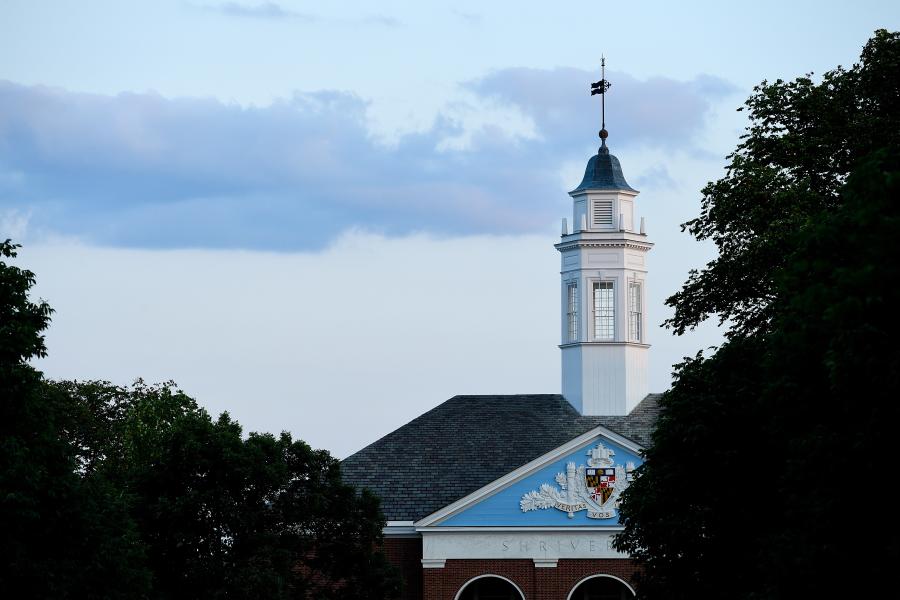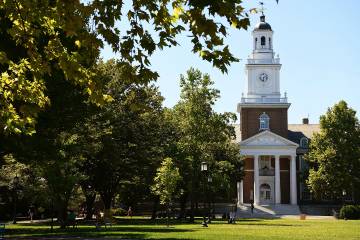Johns Hopkins University is seeking input on the draft of its new Climate Action and Sustainability Plan, which will set JHU on a path to combat climate change and make sustainability a guiding pillar across operations, teaching, research, and community partnerships.
Comments on the plan can be submitted online through Oct. 20. University affiliates and community members are also encouraged to share their thoughts during the Office of Sustainability's town halls on Oct. 4 at the Bloomberg School of Public Health and Oct. 11 on the Homewood Campus. Other academic departments, centers, and institutes across the university will be hosting additional events to showcase sustainability scholarship and community partnerships.
"The climate crisis is a shared global challenge that impacts our institution's future," wrote President Ron Daniels, Executive Vice President of Finance and Administration Laurent Heller, and Interim Provost Stephen Gange in a message to the Hopkins community on Wednesday. "Our university's best response is one informed by research, evidence, and best practices informed by the voices of our full JHU community and those of our neighbors here in Baltimore and beyond. Your feedback is vital to ensuring that our priorities reflect the breadth of perspectives across the University and will directly inform updates to the final Plan."
Led by a steering committee and supported by advisory and technical working groups, the Climate Action and Sustainability Plan has been shaped by over 1,500 JHU affiliates and community members over the past year and a half. After integrating input from the current comment period, the final version is scheduled to be released in the spring.
"We are proud this plan embodies feedback from the full spectrum of the JHU community across all our schools and divisions, along with Baltimore community partners, who all share an ambitious and collaborative vision for a healthy, just, and sustainable future," said Julian Goresko, the director of sustainability.
The current draft is separated into five sections, each of which outlines the institution's goals and objectives in a different area, as well as key actions that university leaders plan to take in the upcoming years.
Research, Teaching, & Scholarship, the draft's first section, focuses on ways that JHU can strengthen its role as a leader in sustainability solutions. This includes accelerating cross-disciplinary collaboration, hosting sustainability-oriented degree programs and community programming, and infusing discussions of environmental justice into all areas of the academic experience. The section also includes a new "Research and Academics Initiative," which will convene JHU scholars from all divisions to tackle pressing environmental challenges on both local and global levels.
The Climate Action section lists ways that the university can "boldly act to reduce greenhouse gas emissions." Objectives include achieving net zero scope 1 and 2 greenhouse gas emissions by 2040 and establishing an initiative to address scope 3 emissions. The section also outlines key opportunities to prepare JHU campuses and local neighborhoods for future climate conditions, as well as a new "Environmental Justice Initiative," which aims to strengthen collaboration between Hopkins and the Baltimore community.
Built and Natural Environments focuses on how the university will prioritize health in its buildings and expand access to greenspace on its campuses. This section also establishes ways for campuses to support the environment by enhancing biodiversity, managing stormwater, and increasing tree cover, among other ideas.
The section on Responsible Consumption commits JHU to a "pathway to zero waste," which includes eliminating single-use plastics from dining and retail locations and achieving zero pre-consumer food waste. The university also aims to support sustainable, local food production and improve food security among affiliates.
The draft's final section, Transportation and Mobility, focuses on increasing sustainable transportation in order to reduce emissions. This includes lowering parking demand, supporting alternative commuting, transitioning to electric vehicles, and building partnerships to support Baltimore's sustainable transportation options.
"Climate change is already manifesting as extreme heat, poor air quality, and flooding events, all of which are threatening the health, well-being, and vitality of JHU and its communities," the plan's overview states. "This is not a moment for complacency. We are poised at a defining moment for how life on our planet will look for the next several generations. JHU is no stranger to acting boldly in the face of society's most pressing challenges, and climate action and sustainability should be no exception."
Posted in University News









